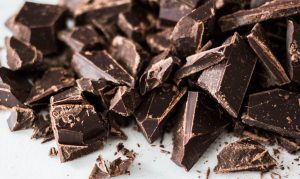 OK, I realize a lot of my recommendations with cutting out sticky snacks and treats may seem nearly impossible depending on your child’s palate at this point in time, but please trust that sugar is much like a drug and you can “detox” away from it and reprogram your child’s taste buds (and your own) to crave less sweet and carby foods. It will take time and commitment, but I know you can do it! Remember, this is for their dental AND overall health.
OK, I realize a lot of my recommendations with cutting out sticky snacks and treats may seem nearly impossible depending on your child’s palate at this point in time, but please trust that sugar is much like a drug and you can “detox” away from it and reprogram your child’s taste buds (and your own) to crave less sweet and carby foods. It will take time and commitment, but I know you can do it! Remember, this is for their dental AND overall health.
All this being said, kids are kids and they love treats! I am often asked what do I give my own daughters for dessert? My girls are offered dessert every night, but only if they have eaten nearly all of their dinner and at least have had “thank you bites” of things they don’t care for or things that are new. A “thank you” bite in our home means you at least take one small nibble to see if you like it (very often they realize they do) and if not, you “politely” push it to the side of your plate, all while being thankful for the person who prepared the food for you and for having a nice meal on your table. I got this idea from my sister-in-law, Jackie, and really think it is such a winner! It isn’t always rainbows and butterflies when we request the thank you bite, but I find the message to be very powerful and therefore it is something we keep encouraging with our kiddo’s, with or without the argument and fuss.
As for treats after dinner, I switch up the offerings with most nights being “fruit dessert” or “yogurt-ice-cream.” This means I give them the fruit of their choice or we take plain yogurt and add fruit with maybe a little granola (we try to make it ourselves to control the sugar added) and a drizzle of honey or maple syrup. Every other night or so, I offer real ice cream (preferably chocolate), popsicles (which again we try to make ourselves to control sugar levels), or dark chocolate. Dark chocolate (not milk chocolate) has many health benefits. It even has a compound in it called Theobromine that can remineralize teeth, so trying to get your child on the dark chocolate band-wagon is a wonderful challenge to begin. Start them out really young, or if you have an older child try to slowly buy chocolate with a higher and higher cacao percentage, trying to get up to 90% or higher and trying to find Fair Trade certified when you can. The more cacao and the less sugar, the better.
 To recap, I am totally OK with ice cream, popsicles, and chocolate (the darker the better) because these things DO NOT STICK to the teeth. Sugars can easily melt away and be rinsed off with a few sips of water as opposed to sticky cookies, brownies, pastries, and candies that will stick on the chewing surfaces of teeth or get pushed down in between the teeth and sit for often hours, sometimes days if you aren’t flossing, before being brushed or flossed away. Now, I am not a baker, but if you are then attempt to limit these types of treats and do try to make baked goods with less sugar added (cane sugar is preferred as it is unrefined) or more natural sugar substitutes like apple sauce, coconut sugar, stevia, maple syrup, molasses, or honey. I do feel cooking with your kids is such a beautiful and beneficial activity, so again, if you do bake, be sure to include the kids and cut down on the sugar as best as you can. My kiddo’s get cakes and cookies and things on occasion, usually around holidays and certainly all birthday parties they attend. Again, kids are kids and we need to allow them to enjoy and experience life, but being aware and mindful about their treat choices is really half the battle.
To recap, I am totally OK with ice cream, popsicles, and chocolate (the darker the better) because these things DO NOT STICK to the teeth. Sugars can easily melt away and be rinsed off with a few sips of water as opposed to sticky cookies, brownies, pastries, and candies that will stick on the chewing surfaces of teeth or get pushed down in between the teeth and sit for often hours, sometimes days if you aren’t flossing, before being brushed or flossed away. Now, I am not a baker, but if you are then attempt to limit these types of treats and do try to make baked goods with less sugar added (cane sugar is preferred as it is unrefined) or more natural sugar substitutes like apple sauce, coconut sugar, stevia, maple syrup, molasses, or honey. I do feel cooking with your kids is such a beautiful and beneficial activity, so again, if you do bake, be sure to include the kids and cut down on the sugar as best as you can. My kiddo’s get cakes and cookies and things on occasion, usually around holidays and certainly all birthday parties they attend. Again, kids are kids and we need to allow them to enjoy and experience life, but being aware and mindful about their treat choices is really half the battle.
More on cooking (and baking!!) with your kids in future blog posts and on my YouTube channel, Doctor Staci. Stay strong parents, you got this! And remember to try and encourage your children to Eat A Rainbow daily for optimal dental and overall health!
The information provided on this site is not intended as medical or dental advice and should not be interpreted as such. The intent is to provide as much scientific information as possible on different dental materials and aspects of dentistry where controversy exists and scientific clarification would be of benefit to patients, staff, dentists, physicians and scientists in making informed judgments. If you seek medical or dental advice, please consult with a health care professional. You must always exercise your own best judgement when using the services of any health care practitioner.
